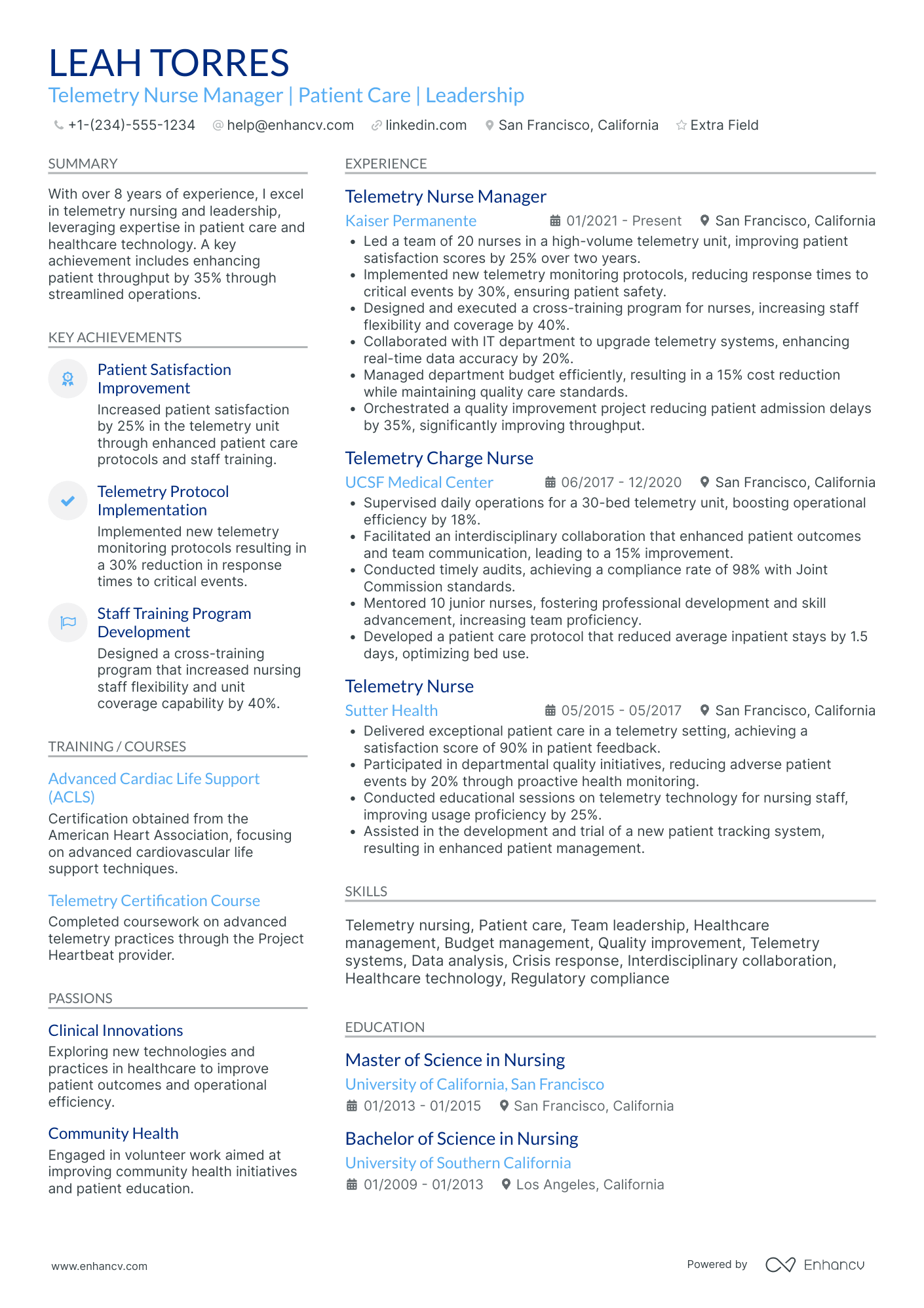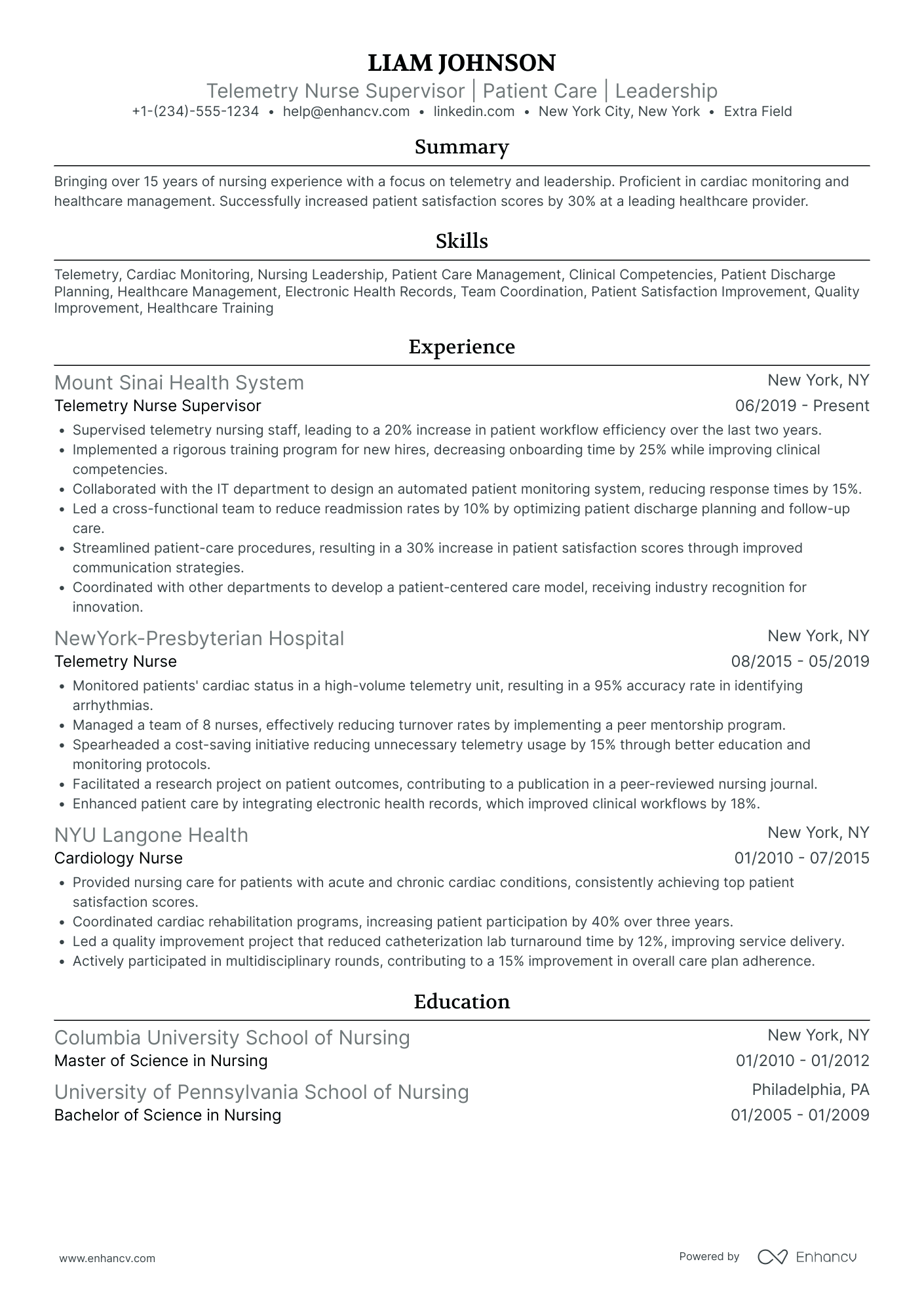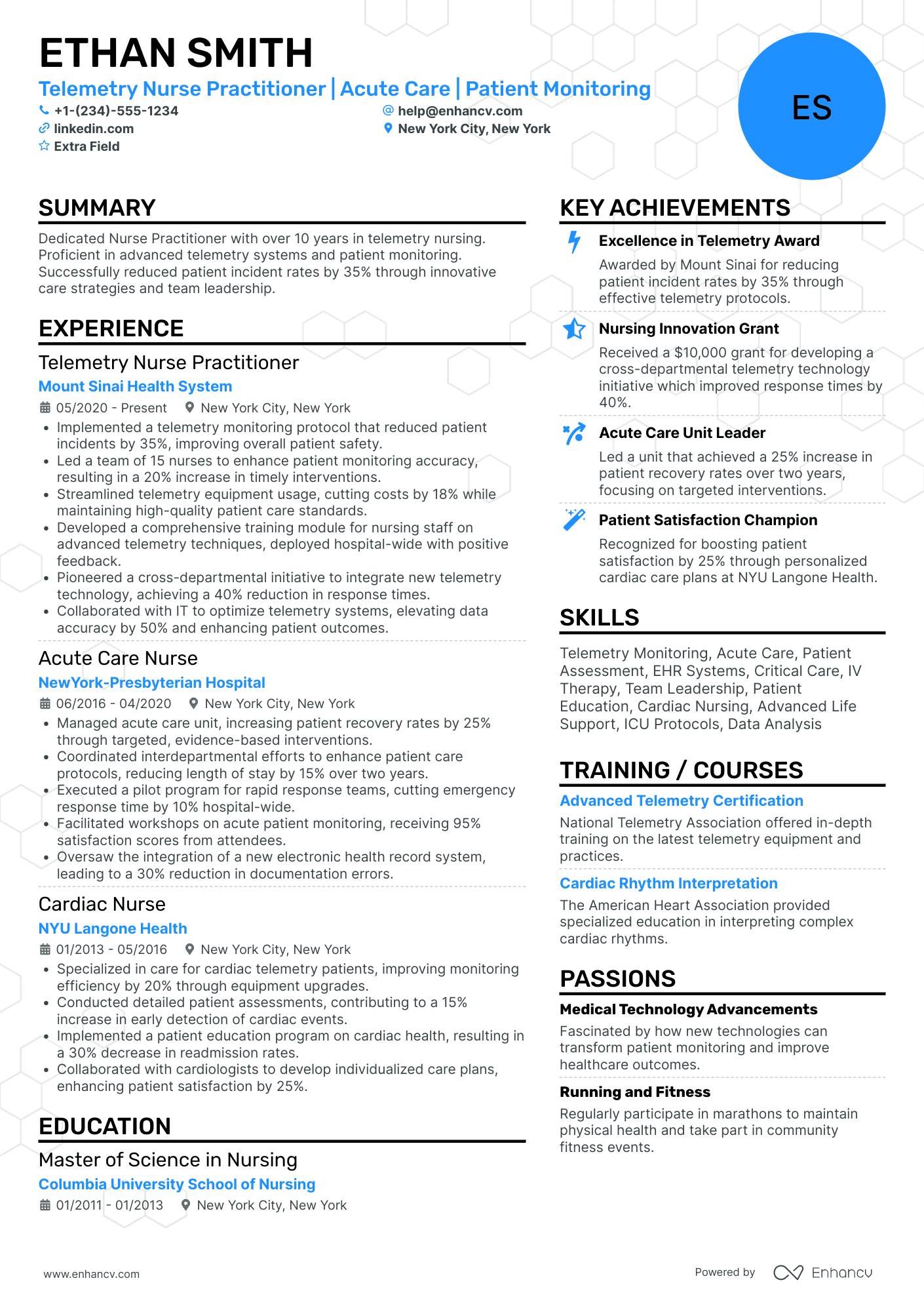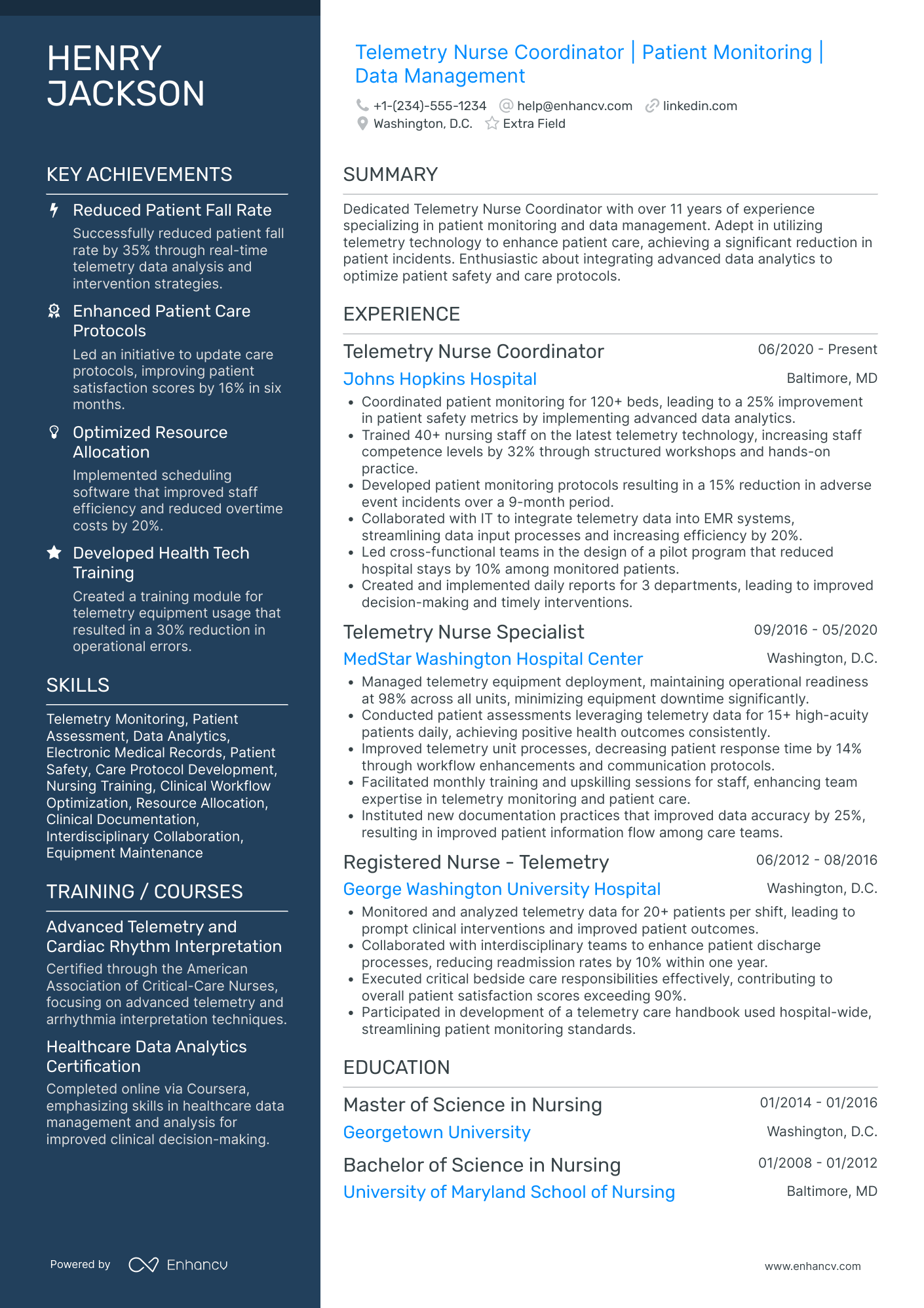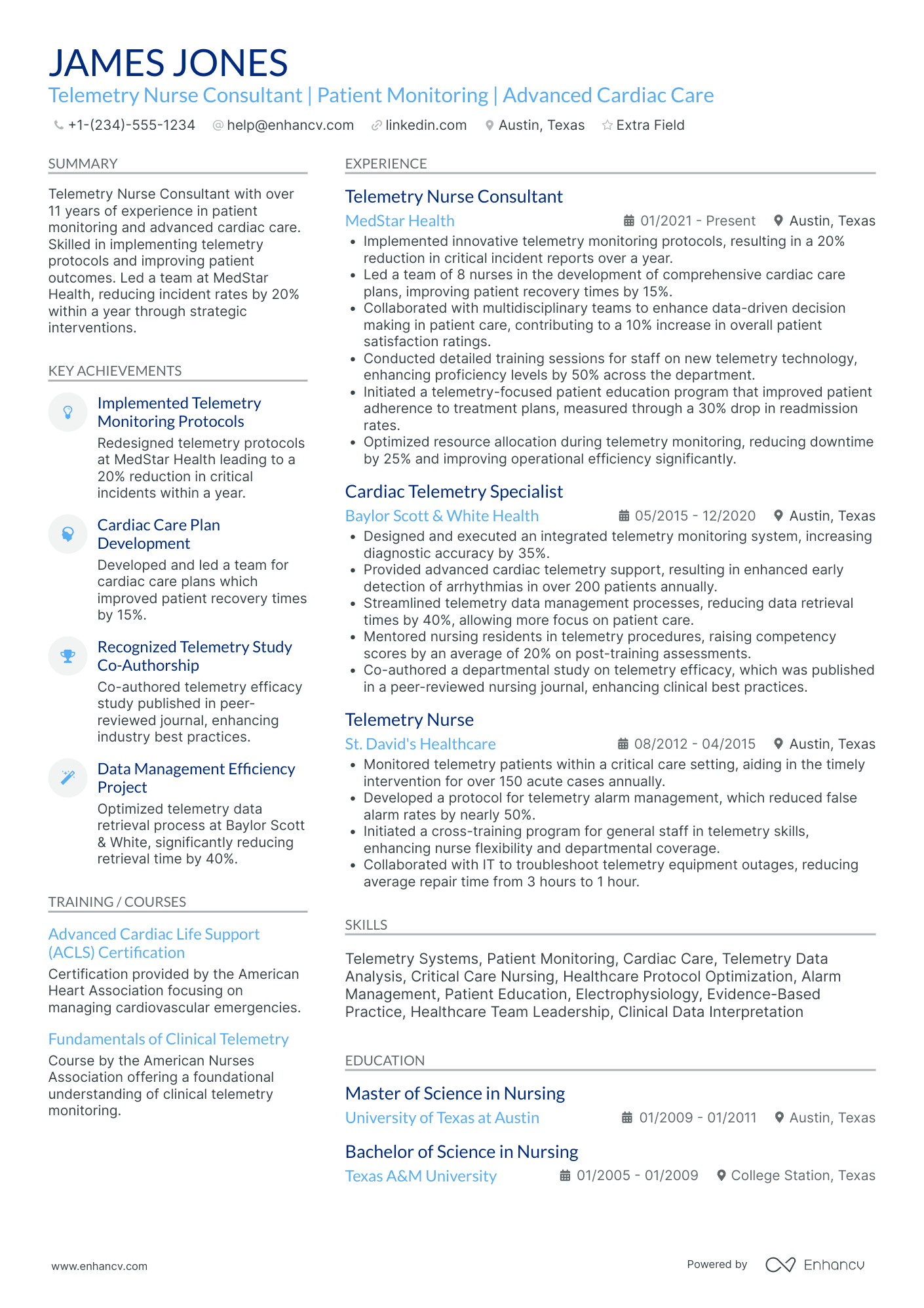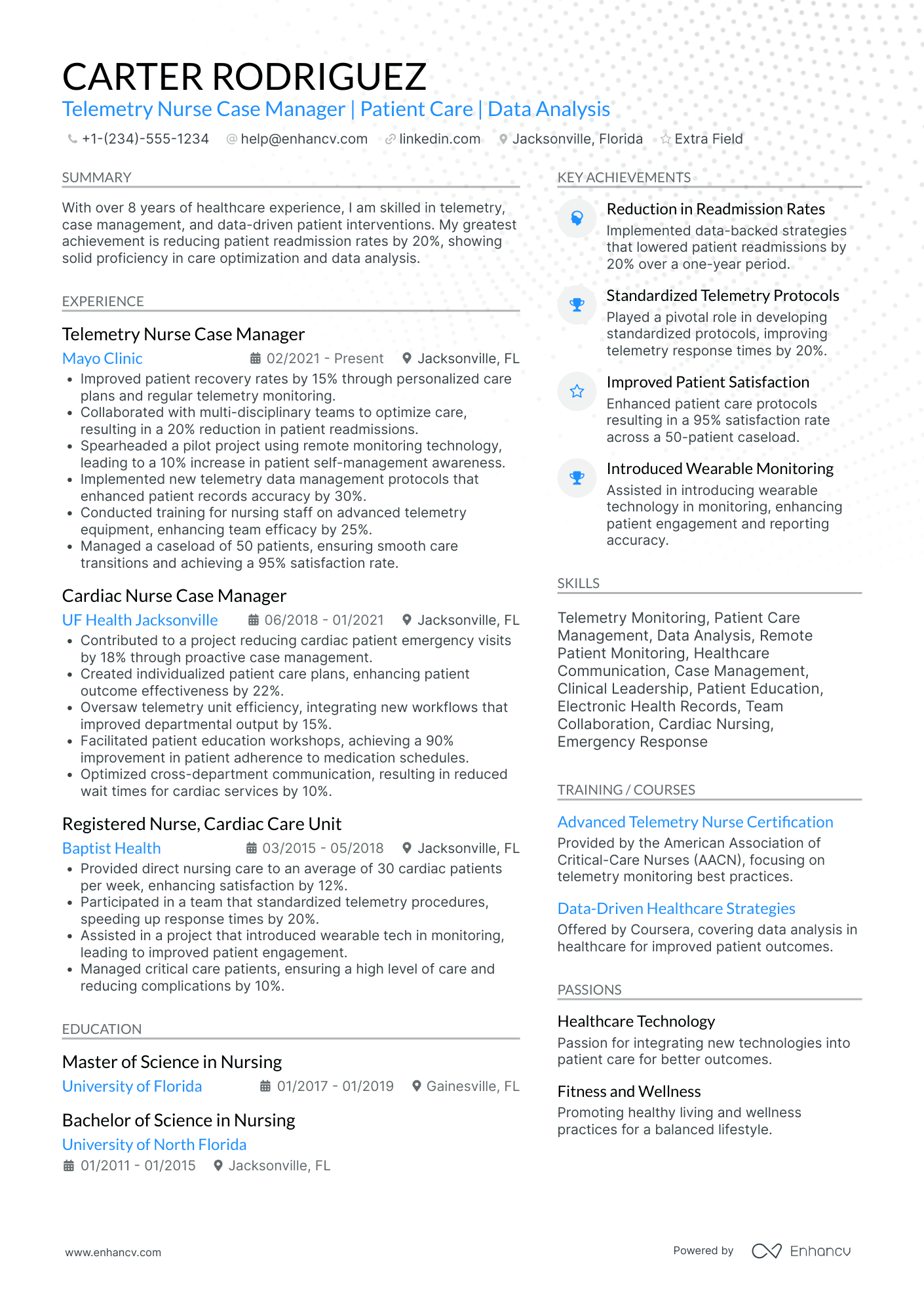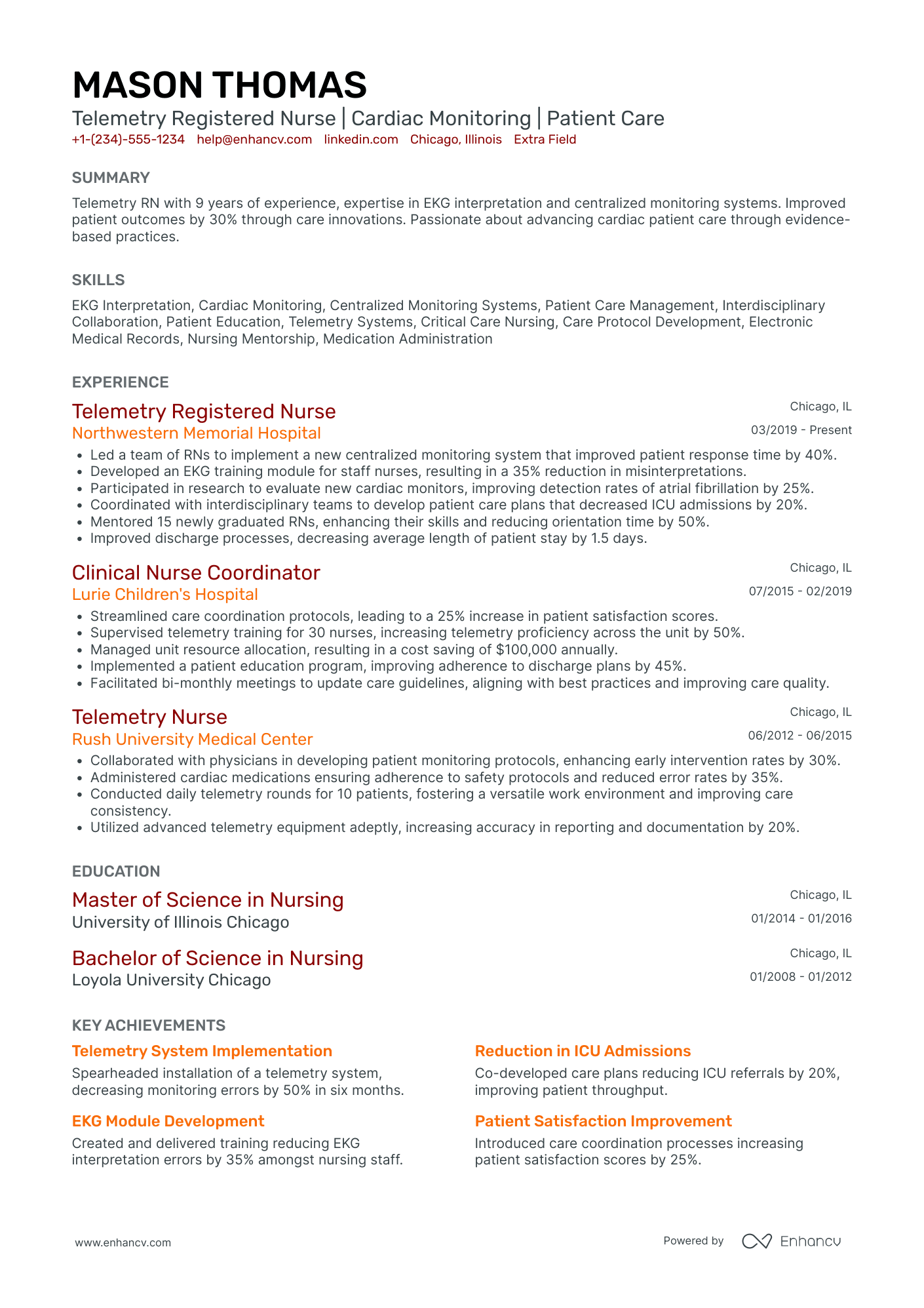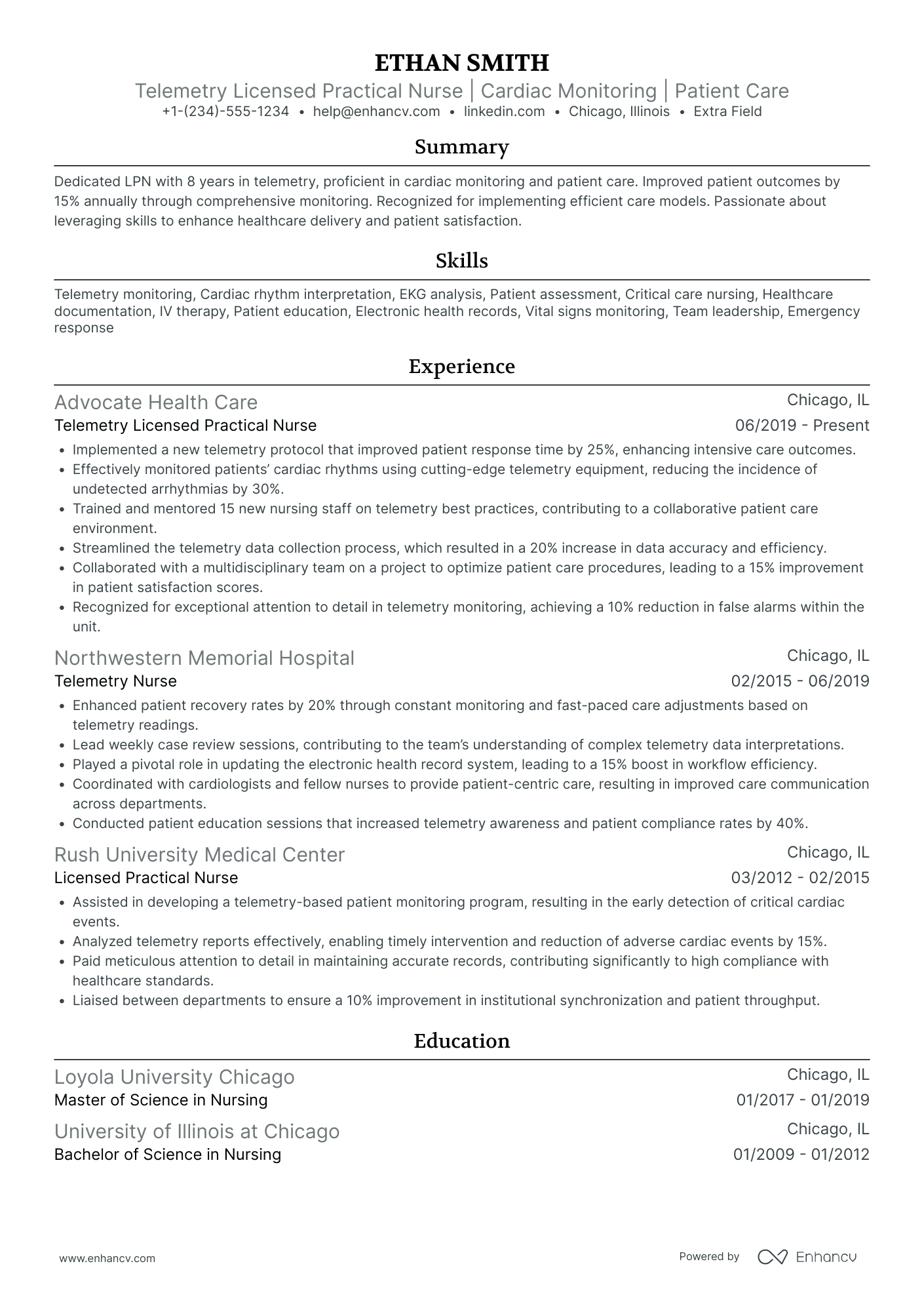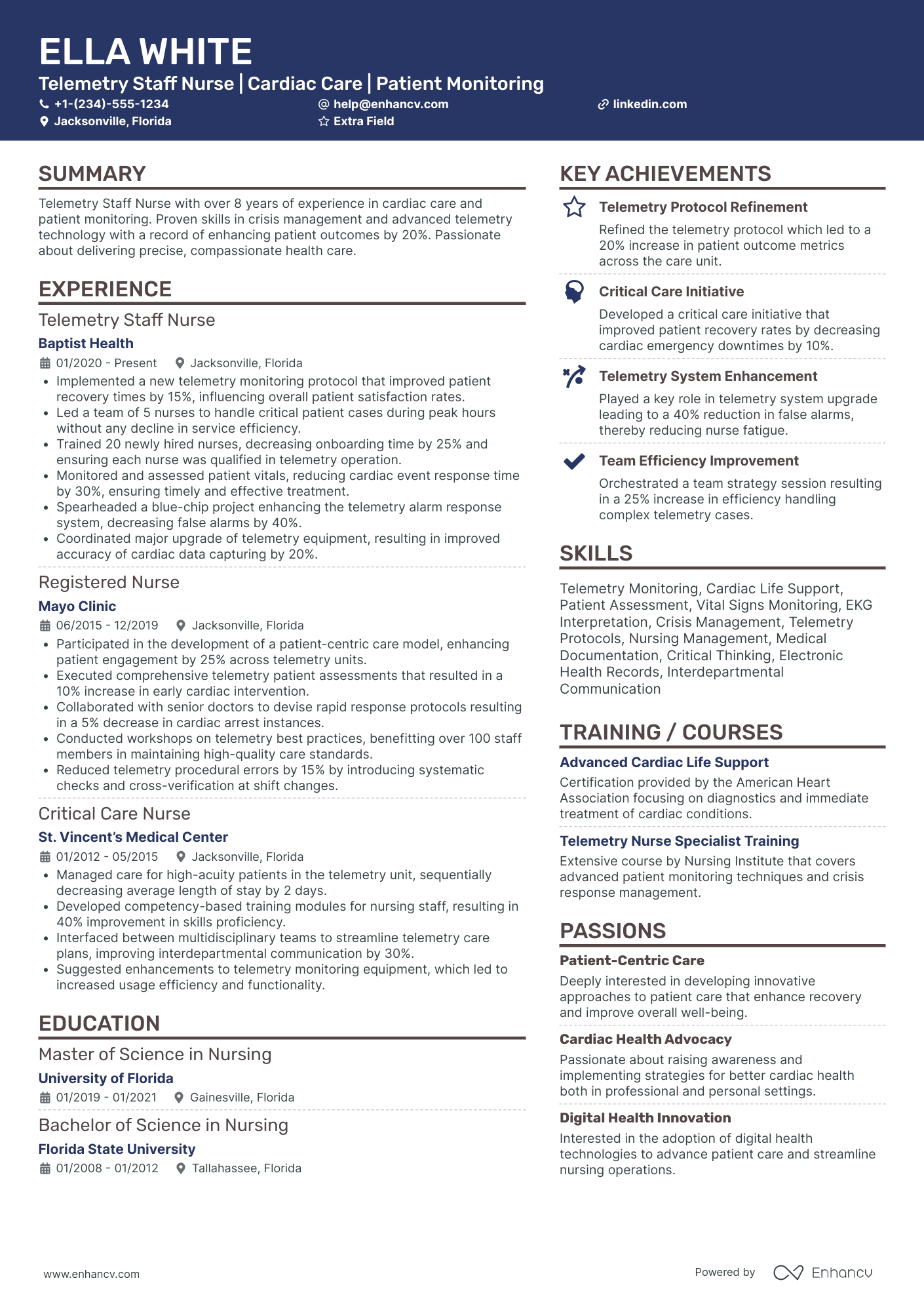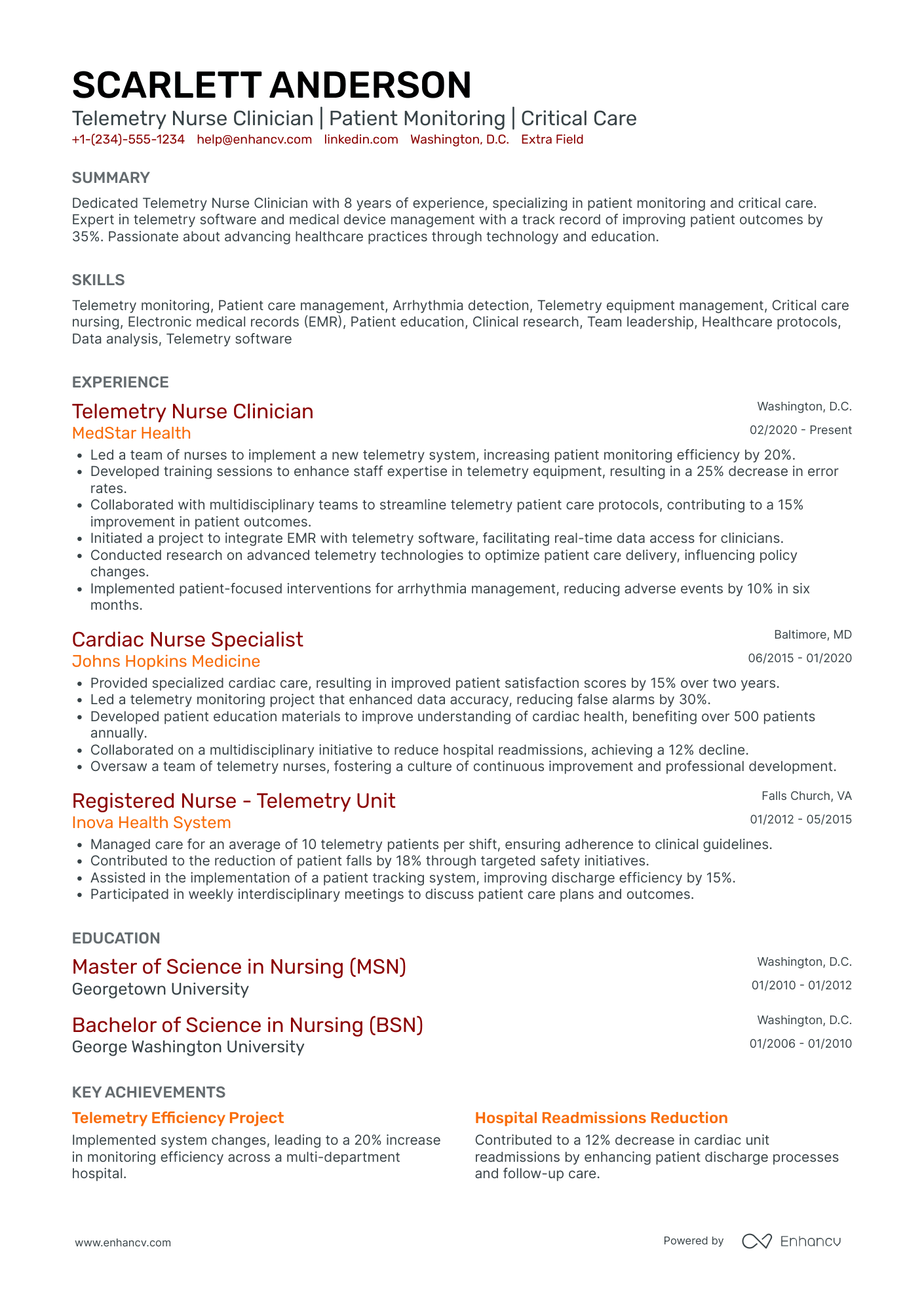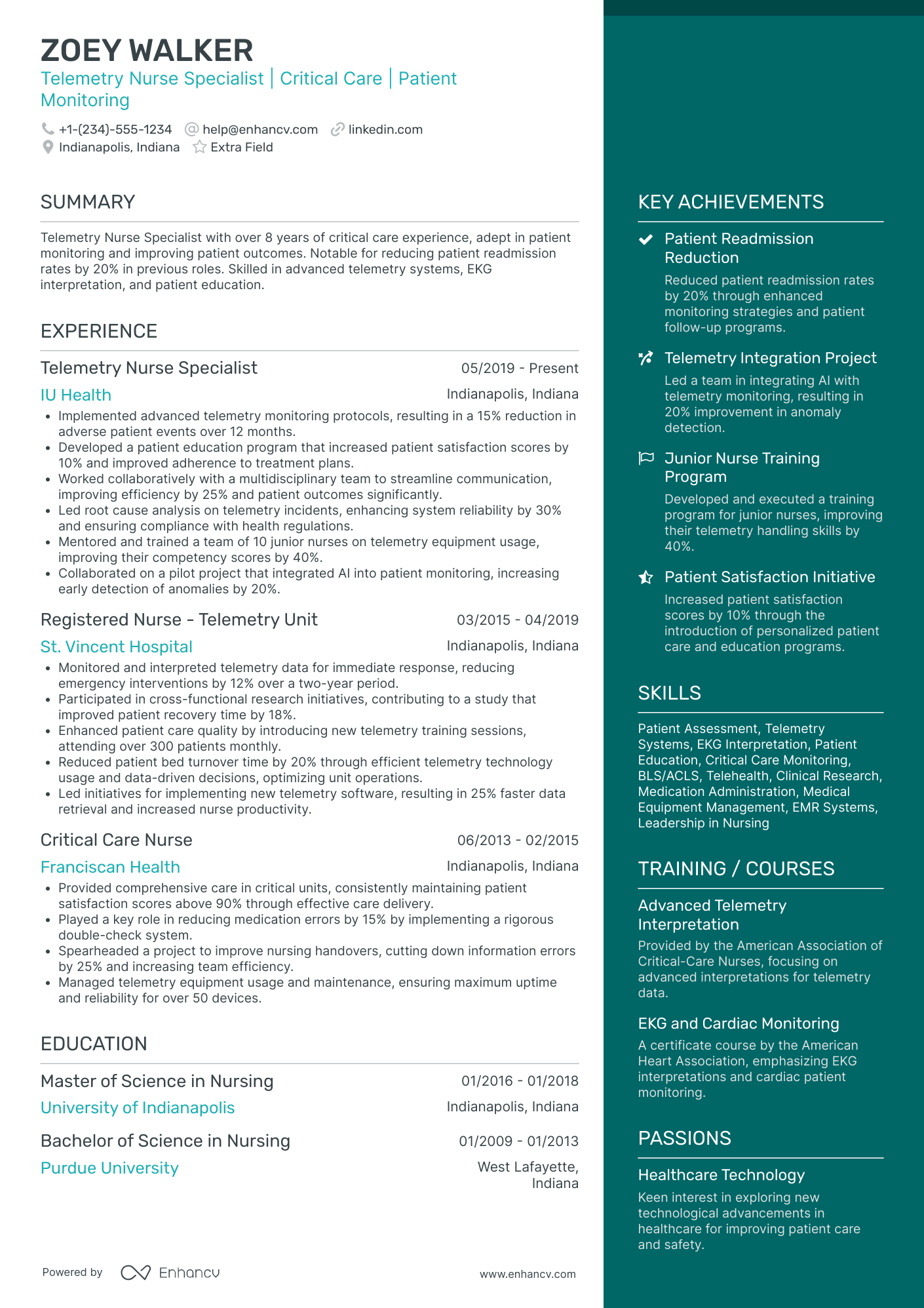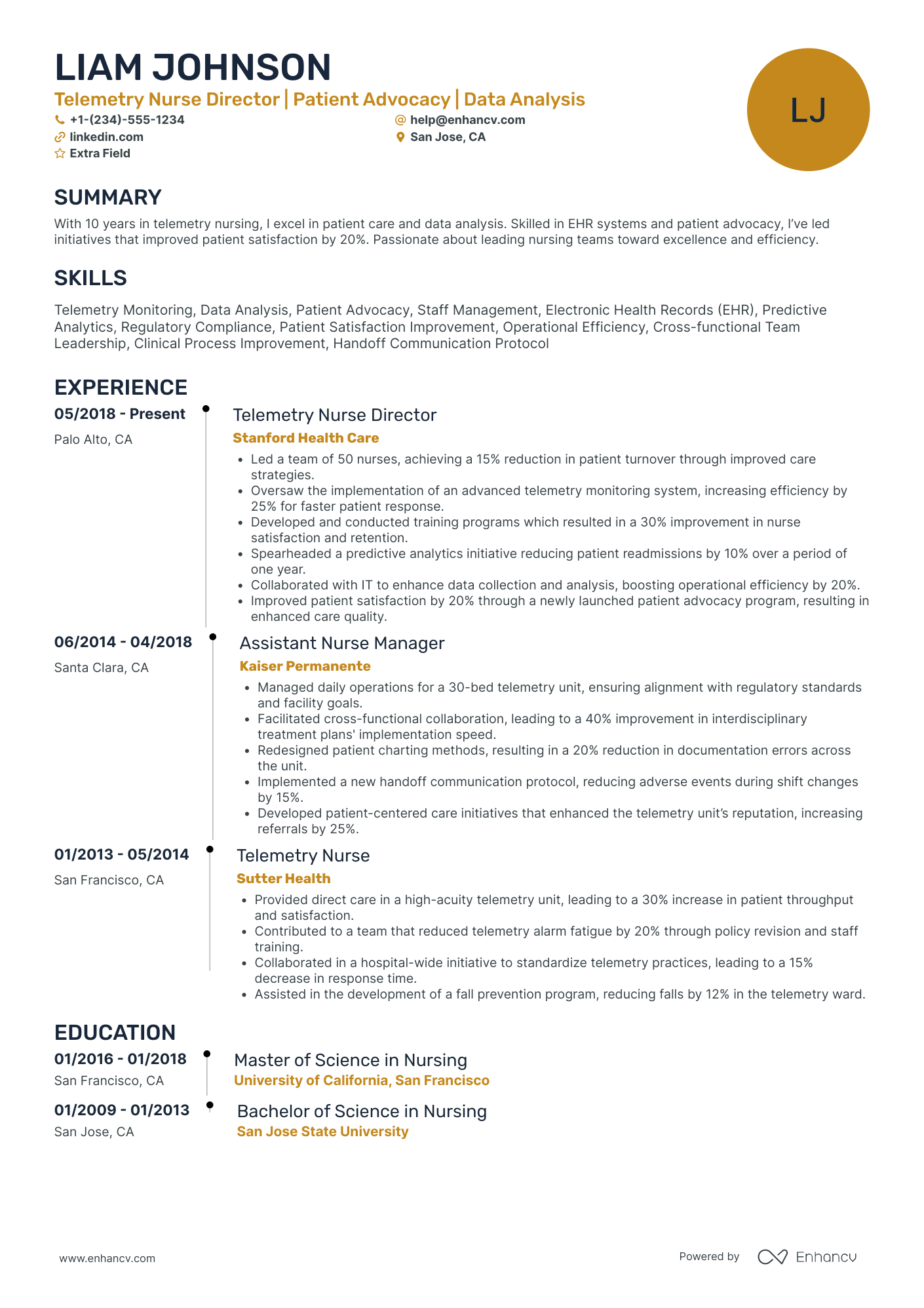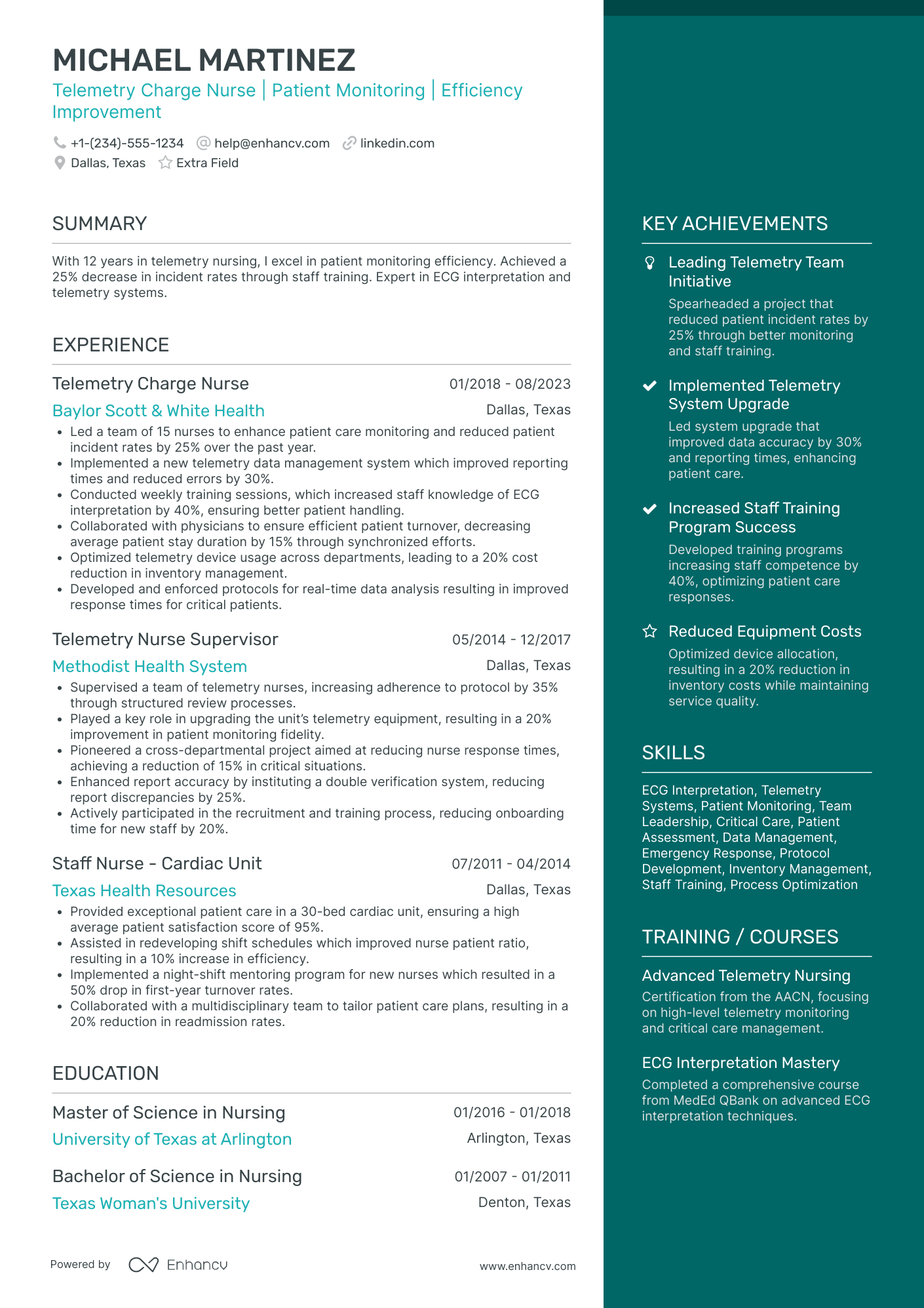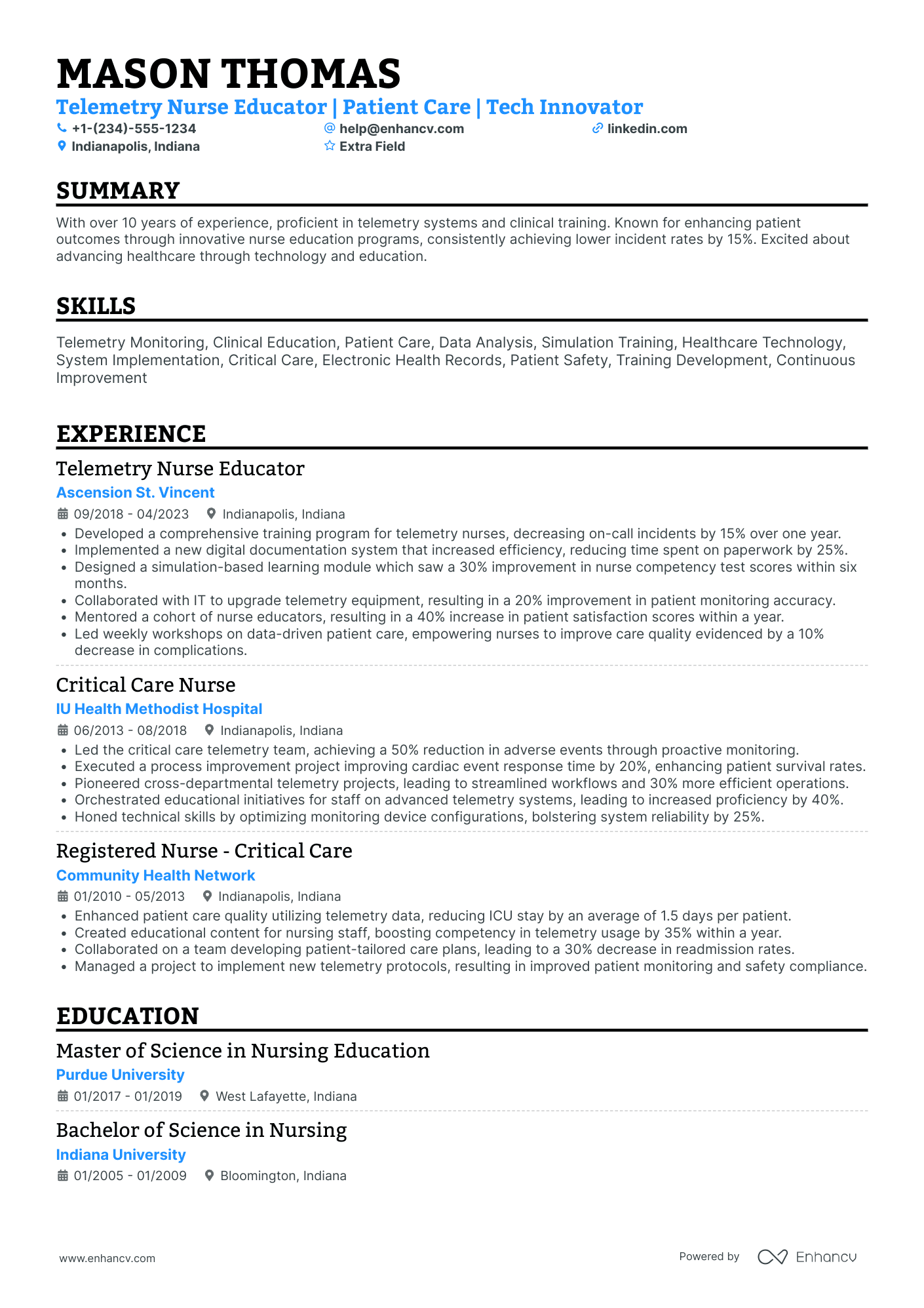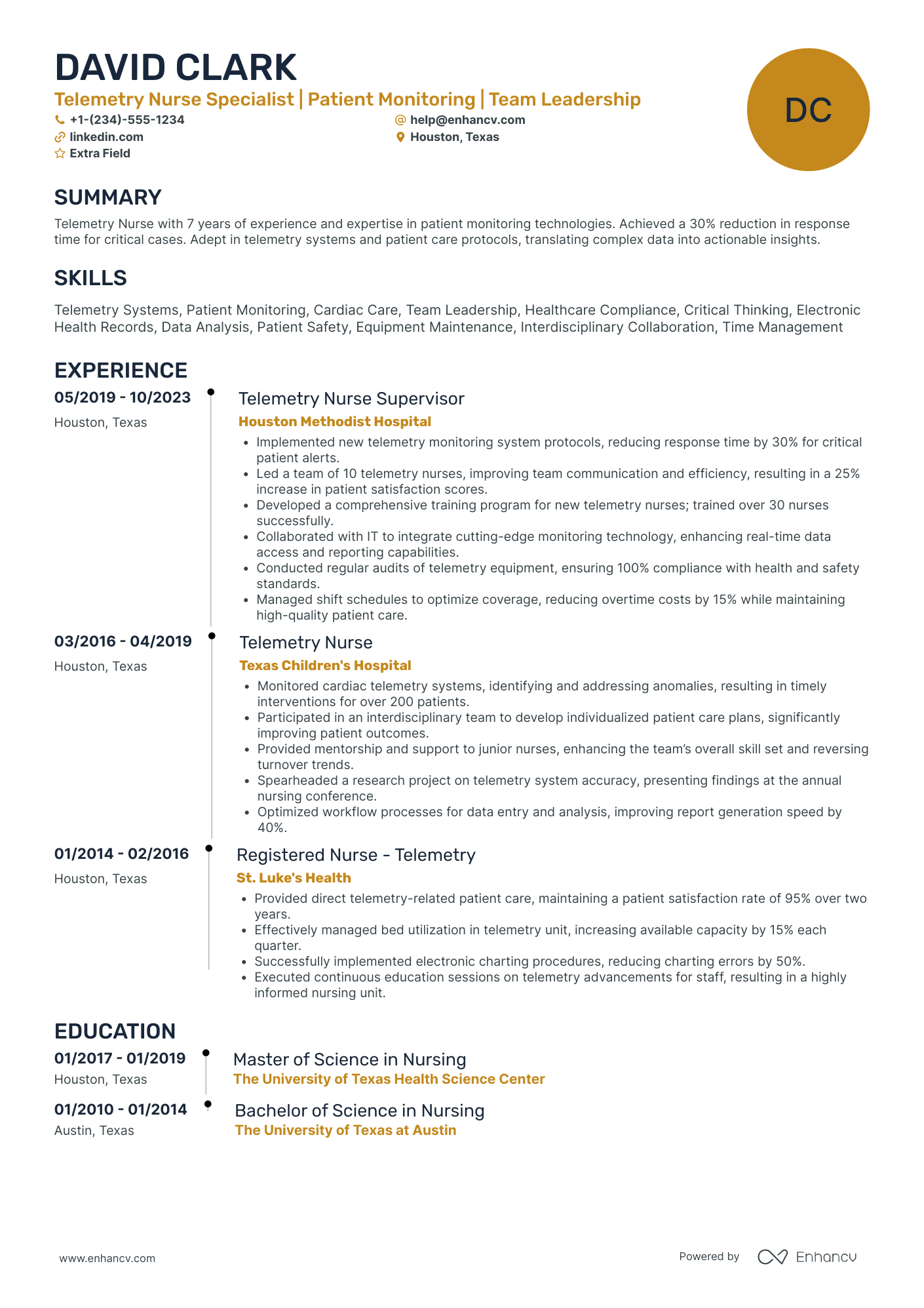Embarking on a career as a telemetry nurse presents an exciting opportunity to specialize in cardiac care, a field that's both challenging and critically important. With the American Heart Association reporting heart disease as the leading cause of death globally, the demand for skilled telemetry nurses is on the rise.
Crafting a standout resume is your first step toward securing a position where you can truly make a difference. This guide will provide you with the essentials to highlight your expertise, experience, and the unique qualities that make you the perfect fit for a telemetry nursing role.
If telemetry nursing isn’t the role you’re searching for, have a look at these related guides:
Save one life, you're a hero. Save a hundred lives, you're a nurse.
Unknown
Let’s jump right into it and explore the different resume formats available to you as a telemetry nurse.
How to format a telemetry nurse resume
Telemetry nursing, a critical branch of health care, focuses on monitoring patients with acute and life-threatening conditions. Crafting a resume for such a specialized role requires a thoughtful approach to format, design, and content.
Firstly we have the reverse chronological order format, which is ideal for those with a steady work history in telemetry nursing. It lists your experience from most recent to oldest, emphasizing career progression.
However, if your experience is lacking then it would be a good idea to consider the functional layout. This focuses on specific skills and qualifications rather than chronological work history. Best suited for new graduates, career changers, or those with gaps in their employment.
More often than not, you may find yourself in the middle of these two. In that case, there’s the hybrid format, which combines elements of both chronological and functional formats. It starts with a skills section followed by a reverse-chronological professional history. It's perfect for nurses with some experience and a broad skill set.
Here are a few other things to keep in mind while creating your resume:
Resume designs
- Keep resume margins between 0.5” and 1” for a clean layout.
- Use professional resume fonts like Arial, Rubic, or Times New Roman at 10-12 pt for readability.
- Stick to a resume length of one or two pages, depending on your career.
Contact information or header
- Include your contact information: name, phone number, and professional email on your resume header.
- Add your LinkedIn profile, but skip the photo to comply with U.S. hiring practices.
- City and state are sufficient for your address; no need for full details.
ATS (applicant tracking systems) compatibility
- Use a simple resume layout and standard headings for sections.
- Incorporate keywords from the job description to pass ATS scans.
File formatting, and naming convention
- Save your resume as a PDF to preserve the format across devices.
- Name your file clearly, for example, "JohnDoeTelemetryNurseResume.pdf" for easy identification.
Think about the location of your application – Canadian resumes, for instance, might follow a different structure.
If your telemetry nursing resume could use a boost, consider using our free AI resume checker. It conducts 16 crucial checks to prepare your resume and enhance your chances of landing interviews.
Is your resume good enough?
Drop your resume here or choose a file. PDF & DOCX only. Max 2MB file size.
Through our research, we have discovered the following:
The top sections on a telemetry nurse resume
- Professional experience: Shows hands-on telemetry nursing skills.
- Certifications: Highlights specialized telemetry training.
- Education: Demonstrates foundational nursing knowledge.
- Technical skills: Details expertise in monitoring equipment.
- Awards and recognitions: Underscores excellence in nursing care.
Remember to touch on these topics as well since most recruiters have their sights set on candidates possessing these abilities:
What recruiters want to see on your resume
- Proficiency in cardiac monitoring: Essential for interpreting heart rhythms and identifying abnormalities.
- Experience with telemetry equipment: Vital for ensuring accurate patient monitoring and data collection.
- Ability to respond to emergencies: Critical for immediate intervention in life-threatening situations.
- Knowledge of cardiac medications: Important for administering and monitoring drug therapies effectively.
- Strong communication skills: Necessary for coordinating care with multidisciplinary teams and educating patients.
Once your format is clear, it’s time to fill it in with your information. Let’s begin with perhaps the most important section of them all—work experience.
Correctly listing your telemetry nurse resume experience
Listing work experience on a telemetry nurse resume is essential. It showcases your practical skills in patient monitoring, familiarity with telemetry equipment, and ability to handle acute care situations.
This section highlights your clinical background, detailing your contributions and achievements, and demonstrates your readiness for the specialized responsibilities of a telemetry nurse.
When writing a work experience entry on a telemetry nurse resume, include the following elements:
- Job title and dates of employment: Clearly identify your role and the time frame, establishing the duration of your experience.
- Employer details: The name of the hospital or healthcare facility provides context about the setting and size.
- Key responsibilities: Highlight specific duties that align with telemetry nursing, such as monitoring cardiac patients, to demonstrate relevant experience.
- Achievements and metrics: Quantify your contributions with specific numbers on your resume, like improving patient recovery rates, to showcase your impact.
- Skills utilized: Mention specialized skills, such as proficiency with cardiac monitoring equipment, to emphasize your qualifications for the role.
- Keywords and action verbs: Keywords on your resume align your experience with the job requirements, helping you pass ATS scans, while action verbs vividly describe your responsibilities and achievements, making your contributions stand out and showing you as a proactive and competent candidate.
PRO TIP
Targeting your resume is crucial because it tailors your application to the specific role and healthcare facility, highlighting your most relevant skills, experiences, and certifications. This approach increases your chances of passing through Applicant Tracking Systems (ATS) and makes a compelling case to hiring managers about why you're the best fit for their team. It’s a strategic customization that can significantly enhance your job application's impact, setting you apart from other candidates.
Including these elements shows your direct experience, achievements, and the specific skills you bring to the position, making your resume more compelling to recruiters.
The best thing to do is to study a couple of example work experience entries and see the difference. Here’s one that could really use some editing.
- •Did regular nurse stuff.
- •Looked after patients.
- •Used some machines
What they did wrong:
- Vague descriptions: Terms like "regular nurse stuff" and "looked after patients" are too vague and don’t convey the specific duties and responsibilities of a telemetry nurse.
- Lack of specificity: The entry fails to mention any specialized telemetry skills, such as monitoring cardiac rhythms or managing complex patient care, which are crucial for this role.
- No quantifiable achievements: It lacks any measurable outcomes or achievements that could demonstrate the impact of the nurse's work on patient care or the healthcare facility.
- Missing technical skills: There's no mention of proficiency with specific telemetry equipment or technologies, which are essential competencies for a telemetry nurse.
- Generic language: The use of general terms like "used some machines" doesn’t provide insight into the nurse's expertise or the technical skills required for telemetry nursing.
- •Monitored and analyzed data from telemetry devices for over 50 patients daily, identifying critical arrhythmias and ensuring timely medical intervention.
- •Spearheaded the implementation of a new digital telemetry monitoring system, improving the accuracy of patient monitoring by 30%.
- •Collaborated with a team of cardiologists, nurse practitioners, and other healthcare professionals to develop patient-centered care plans, resulting in a 25% decrease in patient recovery time.
- •Conducted weekly training sessions for new nursing staff on best practices in telemetry care, contributing to a 15% increase in department efficiency.
What they did right:
- Included a company description: Provides context about the employer, showcasing the scale and scope of the healthcare environment they worked in.
- Quantified achievements: Numbers are used effectively to demonstrate the impact of their work, such as improvements in monitoring accuracy and patient recovery times.
- Highlighted leadership and initiative: Demonstrated leadership by leading system implementation and training sessions, showing an ability to take initiative and contribute to team growth.
- Showed collaboration: Mentioned working with a multidisciplinary team, emphasizing the importance of teamwork in healthcare.
- Focused on patient outcomes: By detailing how their actions led to improved patient recovery times, the candidate underscores their commitment to quality patient care.
PRO TIP
The single most important thing you can do to improve your work experience entry is to quantify your achievements and responsibilities. Using specific numbers, percentages, and statistics to describe your duties and the impact of your work adds credibility and clarity. Quantifying your contributions makes your resume more compelling and helps you stand out to potential employers by clearly showcasing your capabilities and accomplishments.
So, let’s have a closer look at exactly what you should be quantifying in regard to a telemetry nurse position.
How to quantify impact on your resume
- Detail the number of telemetry patients monitored daily to demonstrate workload management skills.
- Specify the percentage reduction in patient complications under your care, showing your impact on patient outcomes.
- Mention the number of emergency situations handled, highlighting your ability to work under pressure.
- Include the ratio of nurses to patients in your telemetry unit, illustrating your efficiency in a high-demand environment.
- State the number of hours spent in continuing education or certification courses related to cardiac care, emphasizing your commitment to professional development.
- Report the percentage increase in patient satisfaction scores during your tenure, reflecting your contribution to patient care quality.
- Document the number of telemetry units you’ve been actively involved with, showing your breadth of experience.
- List the number of training sessions conducted for new staff on telemetry equipment, underscoring your leadership and mentoring abilities.
Writing a telemetry nurse resume without any experience
Getting a job as a telemetry nurse without direct previous experience is a bit tricky but not impossible. It’ll require strategic steps to position yourself as a strong candidate. The first step is to obtain the necessary certifications that are relevant to telemetry nursing.
This often includes Basic Life Support (BLS) and Advanced Cardiac Life Support (ACLS) certifications. These certifications are fundamental for anyone looking to work in a telemetry unit and will demonstrate your commitment to the field as well as your foundational knowledge of critical care practices. They can make you a more attractive candidate even in the absence of direct telemetry experience.
Beyond that here are some other strategies that can help:
- Leverage your nursing education: Highlight relevant coursework or clinical rotations that provide foundational knowledge in cardiac care or critical care nursing.
- Showcase transferable skills: Emphasize skills from other nursing roles or healthcare positions that apply to telemetry nursing, such as patient assessment, attention to detail, and the ability to work in high-pressure situations.
- Gain related experience: Consider positions that can serve as a stepping stone, such as working in a general medical-surgical unit, to gain experience in monitoring patients and managing complex conditions.
- Professional networking: Connect with professionals in the field through nursing associations, conferences, or LinkedIn. Networking can lead to mentorship opportunities and potential job leads.
- Express willingness to learn: In your resume and interviews, highlight your eagerness to undergo additional training and your flexibility to work various shifts, which is often required in telemetry units.
- Apply to new graduate programs: Some hospitals offer new graduate residency programs aimed at training new nurses in specialty areas, including telemetry. These programs provide the necessary education and clinical experience under the guidance of experienced nurses.
Entering telemetry nursing without direct experience is challenging but feasible with the right qualifications, a proactive approach to learning, and a willingness to start in positions that will build your experience.
Listing hard and soft skills on a telemetry nurse resume
Listing both hard and soft skills on a telemetry nurse resume is paramount. Be sure to incorporate them in your resume's skills section, within your work experience descriptions, and in your summary or objective—if you’re including a cover letter, they should definitely be included there as well.
- Skills section: List both hard and soft skills succinctly.
- Work experience: Demonstrate how you've applied these skills in practice, specifying actions taken and their outcomes.
- Summary/Objective: Briefly highlight your most relevant or exceptional skills that align with the job you’re applying for.
Use specific examples and quantify achievements where possible. Aligning these skills with the job description ensures relevance and can help your resume pass Applicant Tracking Systems (ATS).
Telemetry nursing is like being a detective in the hospital. Telemetry nurses often refer to themselves as "heart detectives" because they spend their shifts closely watching patients' heart rhythms on monitors, deciphering the clues to prevent or respond to a cardiac event. This specialized skill set allows them to spot the smallest changes in a pattern, which could be the critical difference in preventing a major health issue. It’s a blend of high-tech surveillance and keen observational skills, making it a unique and exciting field within nursing!
Hard skills are specific, teachable technical abilities or skill sets that are easily measurable, such as proficiency in using telemetry monitoring equipment or understanding EKG interpretations. These are often gained through education, training, and experience in a particular field.
Have you got any of the hard skills below?
Best hard skills for your telemetry nurse resume
- Cardiac monitoring interpretation
- Use of telemetry equipment
- Administration of cardiac medications
- Advanced Cardiac Life Support (ACLS) certification
- Electrocardiogram (EKG) analysis
- Patient assessment and vital signs monitoring
- Intravenous (IV) therapy management
- Central line and PICC care
- Emergency response and CPR
- Electronic Health Record (EHR) software proficiency
- Pacemaker care and monitoring
- Arrhythmia identification and management
- Blood glucose monitoring
- Oxygen therapy administration
- Hemodynamic monitoring
- Wound care management
- Infection control practices
- Medication reconciliation and administration
- Use of defibrillators and external pacemakers
- Patient education on cardiac care
Soft skills are personal attributes and qualities that influence how well you can work or interact with others. These include communication, teamwork, problem-solving, and adaptability—less about technical knowledge and more about how you work and interact in a professional environment. They’re crucial for building relationships with patients and colleagues— ensuring a productive workplace.
Best soft skills for your telemetry nurse resume
- Effective communication
- Critical thinking
- Attention to detail
- Stress management
- Empathy
- Adaptability
- Teamwork
- Time management
- Patient advocacy
- Problem-solving
- Leadership
- Cultural competence
- Active listening
- Ethical judgment
- Resilience
- Decision-making
- Compassion
- Conflict resolution
- Work ethic
- Emotional intelligence
Although having the right combination of skills is essential to practically any job, for telemetry nurses the education section is of equal importance.
How to list your certifications and education on your resume
Detailing your education, certification, and licensure is crucial on a telemetry nurse resume. These elements demonstrate your foundational nursing knowledge, specialized training, and legal eligibility to practice nursing, respectively.
They provide employers with evidence of your qualifications and assure them you meet the necessary standards for patient care and professional practice in a specialized area like telemetry nursing.
Education shows your academic background, certifications highlight specialized skills and knowledge in areas relevant to telemetry, and licensure confirms your legal authority to practice as a nurse, all of which are fundamental to establishing your competency and credibility in the field.
Which section goes where?
On a resume, the placement of the education, certification, and licensure sections can vary depending on your level of experience and the relevance of each to the job you're applying for. Here are the general guidelines:
- Education section: Typically, this section goes towards the end of the resume for experienced professionals who have several years of work history, as their practical experience is more relevant to potential employers. For new graduates or those with less work experience, the education section can be placed higher, often directly after the objective or summary, to highlight academic achievements and relevant coursework.
- Certification section: This can be integrated into the education section or listed separately, depending on the number of certifications and their relevance to the job. If the certifications are directly relevant to the position you're applying for, you might place this section more prominently, possibly before your work experience, to catch the employer's attention early.
- Licensure section: Licensure details can be included within the education section or under a separate licensure section, especially if having a specific license is a requirement for the job. For roles where licensure is critical, such as in nursing or law, you might choose to highlight this information near the top of your resume, after your summary.
Ultimately, the key is to prioritize the placement of each section based on what will most strongly appeal to your potential employers, considering the specific requirements and qualifications valued in your field.
Now, let’s look at some examples. First, we’ll see what a proper education listing should look like. Be sure to include the following in your entries:
An education entry on a resume should include the following key pieces of information:
- Degree: Specify the type of degree earned.
- Major/Field of study: Indicate your major or field of study.
- Institution name: Provide the name of the educational institution from which you graduated.
- Graduation date: Include the month and year of graduation.
- GPA (optional): You may include your GPA on your resume if it's strong (typically, 3.5 or above) and you're a recent graduate. For most experienced professionals, the GPA can be omitted.
- Relevant coursework (optional): Listing specific courses can be helpful, especially for recent graduates with limited work experience or if the courses are highly relevant to the job.
- Honors/Awards (optional): If you graduated with honors (cum laude, magna cum laude, summa cum laude) or received any notable awards, include these as well.
The education entry should be concise yet informative, providing potential employers with a clear understanding of your academic background and qualifications.
- •Cum Laude
- •Relevant Coursework: Advanced Cardiac Care, Patient Assessment Techniques, Emergency Care Procedures
- •Certifications: Basic Life Support (BLS), Advanced Cardiac Life Support (ACLS), Certified Telemetry Nurse (CTN)
This example excels for many reasons. One is its clarity and conciseness, which make it easy for hiring managers to quickly understand the candidate’s academic background and achievements. Also, all coursework and certifications are directly relevant to telemetry nursing, highlighting the candidate's readiness.
Besides that, their achievements are highlighted. For instance, mentioning graduation with honors (Cum Laude) emphasizes academic excellence, suggesting a high level of dedication and capability. Lastly, they chose to include the essential certification within the education section, which helps to consolidate important qualifications, making the resume more streamlined and impactful.
However, you likely feel that your licensure and/or your certifications need their own section. In that case, here’s an example of what a certification listing may look like for a telemetry nurse.
- •Renewed March 2022
- •Successfully completed 40 hours of specialized training in cardiac monitoring and telemetry.
- •Passed the comprehensive CTN certification exam, demonstrating proficiency in telemetry technology and patient care.
Licensure should appear as follows:
- •License No. RN1234567, Expires: June 2024
- •Maintains current registration and adherence to professional standards as set by the State Board of Nursing.
- •Participates in ongoing professional development and training to ensure the highest level of care in telemetry nursing.
For your certifications and licensure, remember to be specific and detailed. Provide as much information as possible and demonstrate how committed you are to your profession.
We have put together a short list of the needed certifications for a telemetry nurse.
Best certifications for your telemetry nurse resume
Writing a telemetry nurse resume summary or objective
A resume summary or objective is often considered the most important section on a resume for several reasons:
- First impression: It's the first section that hiring managers read so a well-crafted summary or objective can capture the employer's interest and encourage them to read further.
- Highlights your value: This section succinctly highlights your most relevant qualifications, experiences, and skills, demonstrating your value to the employer right from the start.
- Tailors your application: It allows you to tailor your resume to the specific job and company, showing how your goals align with their needs.
- Showcases your goals and vision: Especially with an objective statement, you can convey your career aspirations and how they align with the opportunities the position offers, making a case for why you're not just qualified but also motivated and forward-thinking.
Given its strategic placement and concentrated content, this section can strongly influence how the rest of your resume is interpreted, setting the stage for a persuasive argument in your favor as the ideal candidate.
But what’s the difference between the two types?
- A resume summary is a concise overview of your professional background and key qualifications. It's targeted towards experienced telemetry nurses, summarizing their years of experience, areas of expertise, significant achievements, and the unique skills they bring to the position. The summary is designed to quickly show employers why you're a strong candidate for the job based on your past successes and capabilities.
- An objective statement is more about your career goals and what you're looking for in your next role. It's ideal for new graduates, nurses transitioning into telemetry from another specialty or those with less direct experience in telemetry nursing. The objective statement expresses your intent to grow within the field of telemetry, your commitment to learning, and how you plan to contribute to a prospective employer, focusing more on what you seek to achieve and how you align with their particular goals.
Let’s check out a summary done sloppily.
This summary lacks specificity, fails to highlight any specific skills or achievements, and focuses on the candidate's desires rather than what they can offer to the employer. It doesn't convey a strong sense of professionalism or dedication to the field of telemetry nursing, which is crucial for making a positive impression.
Now, let’s transform that same summary into something effective.
This summary achieves its goal because it concisely showcases the nurse's experience, expertise in telemetry nursing, and specific achievements. It highlights key skills relevant to the job and quantifies an improvement, demonstrating the candidate's direct impact on patient care and operational efficiency.
Even after all of these sections, you still find yourself with some white space on your resume. Let’s explore some optional additional sections you can use to project yourself as the ideal candidate.
Optimize your resume summary and objective for ATS
Drop your resume here or choose a file.
PDF & DOCX only. Max 2MB file size.
Additional sections for a telemetry nurse resume
Adding additional sections to your telemetry nurse resume is beneficial because it allows you to present a comprehensive view of your professional qualifications beyond traditional work experience. These sections can showcase any special achievements or awards that distinguish you from other candidates.
Furthermore, they offer an opportunity to display your soft skills, volunteer experiences, and other interests that contribute to your overall suitability for the role. By providing a fuller picture of your capabilities and character, these additional sections can make your resume stand out to potential employers, demonstrating not just your technical proficiency but also your dedication and holistic approach to patient care.
Here are a few additional sections that a telemetry nurse could include on their resume:
- Professional development: Include any workshops, seminars, or courses related to telemetry or cardiac care to show ongoing learning.
- Awards and recognitions: Mention any awards or acknowledgments received for your nursing care, teamwork, or dedication to patient care.
- Volunteer experience: Add volunteer work on your resume, especially if it's healthcare-related, to demonstrate your commitment to community service and patient care.
- Professional memberships: List memberships in professional organizations like the American Association of Critical-Care Nurses (AACN) to indicate your active engagement in the nursing community.
- Languages: If you speak additional languages, include them, as this can be highly beneficial in diverse healthcare settings for patient communication.
Key takeaways
We hope that you found this guide useful and would like to sum up in several sentences the key points we wanted to make.
- A standout resume is crucial for securing a telemetry nurse position, highlighting expertise, experience, and unique qualities.
- Resume formats for telemetry nurses include reverse chronological order, functional, and hybrid, catering to different levels of experience and skill sets.
- Essential resume elements for telemetry nurses include professional experience, certifications, education, technical skills, and awards/recognition.
- Recruiters prioritize telemetry nurse candidates with proficiency in cardiac monitoring, experience with telemetry equipment, emergency response capability, knowledge of cardiac medications, and strong communication skills.
- Work experience entries should detail job titles, employment dates, employer context, key responsibilities, achievements with metrics, and specialized skills, using keywords and action verbs for ATS optimization.
- Quantifying impact on a resume, like detailing the number of patients monitored or emergency situations handled, demonstrates workload management skills and the ability to work under pressure.
- Certifications such as BLS, ACLS, PCCN, CCRN, and Telemetry Certification are crucial for telemetry nurses, showcasing their commitment to the field and foundational knowledge.
- The resume summary or objective is critical for making a first impression, highlighting a candidate's value, tailoring the application to the job, and showcasing career goals and vision.
Telemetry Nurse resume examples
By Role
